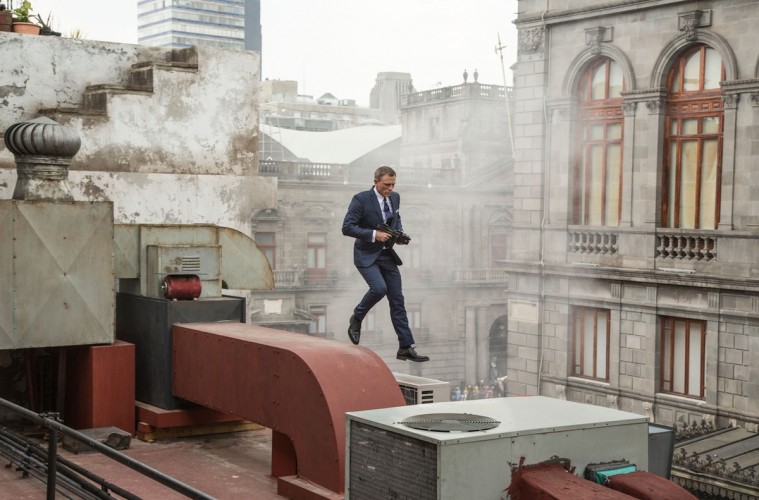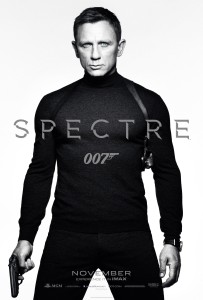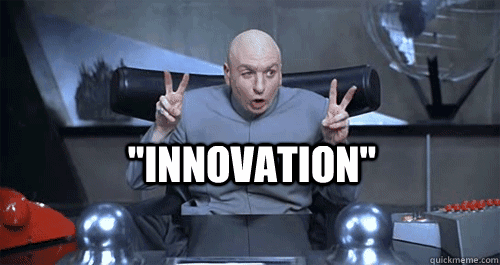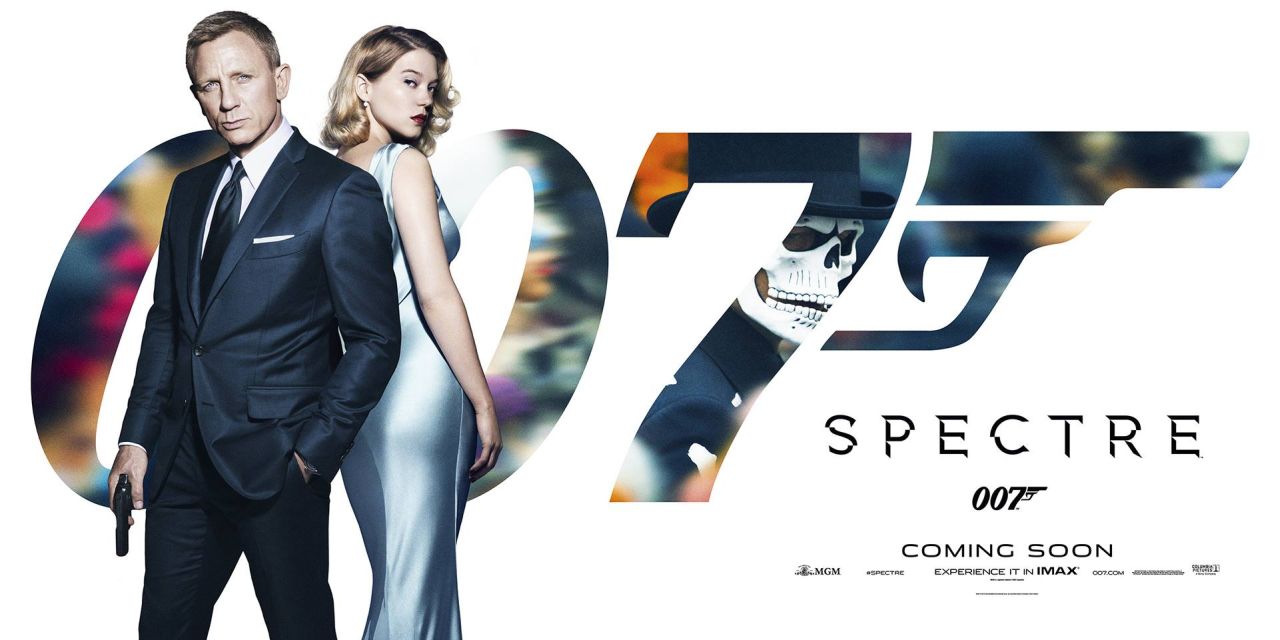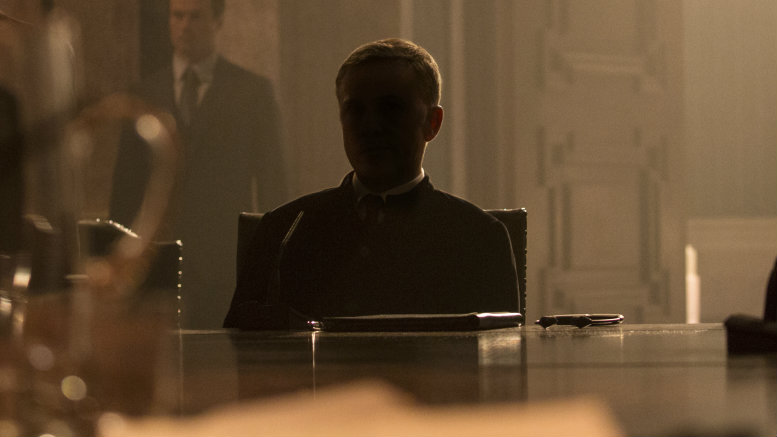It’s time to take a cold, hard, steely, Smolder-style look at the 24th Bond movie after months, nay, years of speculation. From a #Bond_age_ perspective the journey from #Bond24 to #Spectre felt like an interminable marathon. Remember when we did a whole podcast about the tactleneck in the first teaser poster?
Good times.
Daniel Craig’s fourth Bond film promised us many things in advance. Daniel Craig promised a lighter Bond. Mendes promised a continuation of the Skyfall narrative. The teaser trailer promised us snowbound Craigers! (Skiing, maybe?) The end to a decades long legal feud between EON and Kevin McClory (who most surely returned from the grave after the release of Spectre to sue someone) promised the return of the global shadow organization SPECTRE – and presumably at some point the man with the master plans and the original grumpy cat, Blofeld.
SPECTRE had been decommissioned Bond property since McClory successfully lobbied for the rights to SPECTRE and Blofeld after Ian Fleming turned the screenplay he and McClory had penned for an early version of Thunderball (then called Longitude 78) into the Thunderball novel. In 1965 EON licensed the rights from McClory for 10 years. When the rights reverted back, Bond lost his long time nemesis. Consequently, in a grand symbolic gesture during the pre-titles of For Your Eyes Only, Bond dropped a Blofeld-type character down a smoke stack. The scene had no bearing on the narrative of the film and existed solely to raise a collective middle finger at Kevin McClory. “We don’t need no stinkin’ Blofelds!” it suggested.
And indeed, Blofeld had lost his utility. In the years that followed, Blofeld would even become representative of the campiest aspects of the Bond series, the most ripe for parody – as evidenced by Dr. Evil in Austin Powers. While there are elements from many Bond villains contained within the Dr. Evil character, the primary influence is unmistakably Donald Pleasance’s Blofeld in You Only Live Twice. I’ll save any further Blofeld editorialization for my full #Bond_age_ essay on Spectre. Suffice it to say that use of the original, farcical Blofeld character would be impossible in the gritty and grounded Craig era. A new Blofeld would require… innovation.
No more beating around the Blofeld. Let’s come right out with it. My one sentence review of Spectre and then we can all go send me disagreeable tweets. Spectre is not a good movie, but it is a good, hearty, old-fashioned Bond movie… until it isn’t. Spectre builds hope, and then burns it to the ground. Like when Halle Berry backdives into a sea of CGI in Die Another Day, I can pinpoint exactly when Spectre thumbs its nose at audiences. Your ultimate opinion on the film will depend on your ability to look the other way in that particular moment, to dare follow the rabbit down the rabbit hole… or more accurately, to follow Bond into yet another Fever Dream.
Spectre Review – Bond’s misplaced ambition, a @007hertzrumble meditation
by James David Patrick
(originally published on thejamesbondsocialmediaproject.com)
Warning: the spoilers ahead are egregious.
A long tracking shot follows a masked man and a masked woman through the streets of Mexico City during the Day of the Dead festival. The extended shot made my film student senses tingle with memory fragments from lectures on Touch of Evil. She’s fetching. He’s dirty blond. (You’re not fooling us, Mr. Bond.) He leads us to a hotel room where he then discards her for the mission. “I’ll be right back,” he says, exiting through the window and out onto the roof. Shades of Roger Moore in The Spy Who Loved Me except pre-coital and no Union Jack. Craigers traverses the rooftops with a hop in his step and a swagger we haven’t seen since Casino Royale. Oh the joys of watching Bond performing legitimate espionage. This, the best sequence in the film, also serves as an indicator of Spectre‘s ultimate trajectory.

Looking sprightly, Party Craigers.
A little assassination turns into a debacle (as it does with Bond). A building explodes. The falling rubble sets off a domino-effect of crumbling buildings. There’s tense action, and a moment of levity when a well-placed couch rescues our hero from certain demise. The film allows a moment for Bond to collective himself with a wry smile. Party Moore approves.
Bond emerges from the rubble, his cuffs and tie certified straight. Swagger in tact. He continues on with a foot chase through the teeming throngs of masked civilians. Bond’s pursuit shifts to an aerial struggling on a helicopter. The scene, overlong and hectic, manages to make upside-down helicopters feel blasé. There’s no rise to a triumphant moment of pre-title euphoria. (This variety of airborne scrap was better handled in the pre-titles for Tomorrow Never Dies.) There’s just exhaustion as Bond overcomes his adversaries and gains control of the vehicle.
And now, in the theater, I’m energized. This is the Bond I’ve been craving. He’s a lover, a fighter, and a pratfall artist all before Sam Smith warbles his first limp note. In the moment it seemed so obvious. This is the perfect opportunity for Bond to land the helicopter on top of his hotel and return to his Latin damsel. Because James Bond goddamn goes back for the girl, am I right? Thus providing an exclamation point on a scene that – aside from the overlong helicopter action – has damn near been perfect.
But the scene just ends. No final cathartic whimsy. With this potential payoff already duly earned, these jokes write themselves. Instead, Bond exhales. We cut to Sam Smith. I’m disappointed, but hardly deterred in my desire to love Spectre. We’re trending in the right direction here. There’s much to admire about this opening, not the least of which is the tremendous scoring done by Thomas Newman and Hoyte van Hoytema’s cinematography. The opening is proof that we can have a technically brilliant Bond but also have old-fashioned Bond fun. Holy hell, did I just compliment Thomas Newman (aka Not David Arnold)? I did, but let’s not jump to conclusions. The opening scene excepted, the rest of Newman’s score fails to adequately punctuate the action on screen — it’s not that it’s lifeless, far from it actually, but again Newman does not distinguish Spectre from any other competent bit of cinema scoring (the opening and his short nod to On Her Majesty’s Secret Service excepted).
We learn 007 has gone off the reservation again. Witty jousting with the usual MI-6 office mates ensues. M rips off a nice lecture about toeing the government line before dismissing 007 from duty for abuse of the position. Again. Not since Casino Royale have we given Craig a narrative where Bond serves Queen and country through a specified mission. Bond goes rogue. He’s a loose canon that can’t be tamed. Stop me when I stumble across a new plot device from the Craig era. Here Mendes also reveals how he and his screenwriting coven aim to use Spectre as a continuation of the Skyfall narrative… and this is me calling shenanigans. More on this in a minute.
Bond’s journey leads him to Rome and then, at long last, the snowy peaks of Austria. Snow. Covered. Peaks. (Spoiler: Craigers still doesn’t ski. Cue sad @007hertzrumble.) And this leads us to Tangiers and yada yada yada I viewed the remaining hour of the film from behind a suffocating facepalm. It’s not just that they executed just about every single worry I had about the return of Blofeld. It’s that they also executed a screenwriting faux pas equivalent to the “everything was just a dream” twist.
So, yes, Christoph Waltz is Oberhauser/Blofeld. In case you hadn’t heard or read the leaked script. And for good measure, they injected him very deeply into Bond’s past, so deeply in fact that Bond and Blofeld are foster brothers, and Blofeld killed his own father. (Shenanigans.) And then for good measure they made him the “orchestrator” of everything that’s apparently ever happened to Daniel Craig’s Bond. Why? For what purpose? Because of Blofeld’s petulant jealousy and daddy issues, of course.
Blofeld goes on to spout some biological nonsense about cuckoo birds. At the very least the story should have come with narration by David Attenborough. With one languorous bit of pontification, Blofeld declares that he was responsible for Le Chiffre’s plot and Vesper’s death in Casino Royale, oversaw QUANTUM’s bid to incite a Bolivian coup in Quantum of Solace, and championed Silva’s assassination of M (Judi Dench) in Skyfall. There’s not one shred of narrative logic to support this. We’re just supposed to accept this massive, offensive retcon of the entire Craig era because the Spectre filmmakers felt compelled to connect absolutely everything to Blofeld – a character that hasn’t even been EON property since 1975. As a result we know, with 100% certainty, that Blofeld was never, not for one moment, part of some grand scheme. QUANTUM was their grand scheme. But guess what? It wasn’t really QUANTUM in charge because, well, you we figured out that you guys generally didn’t like Quantum of Solace so let’s just pretend none of that mattered anyway, you know, cuz Blofeld (and because Bond has always been subject, for better or worse, to the flippant whims of the moviegoing public).
Me: BUT THAT DOESN’T MAKE SENSE!
Spectre: Yes it does. Nyah. Deal with it.
(F’ing shenanigans, movie.)
There’s no reason to imprint Blofeld into Bond’s past any more than there was a need to make him responsible for the events of the past three Bond movies. It doesn’t add anything to the character. It does however manage to undermine the Craig era. What’s wrong with being a one-off megalomaniac these days? Why can’t Blofeld just be a classically evil criminal mastermind hell bent on world domination? (And while we’re at it why does this movie feel like a remake of Captain America: The Winter Soldier and Mission Impossible: Rogue Nation put together?) Giving Blofeld a personal vendetta against Bond diminishes his menace. It actually makes the character lesser, more local – he’s driven by a petty grudge. It has nothing to do with a sense of superiority or intellect or the need to take over the world. I’m left with images of a pimply-faced Blofeld sitting alone in his room, scrapbooking 007 press clippings and sketching his face into each picture just over Bond’s shoulder.
Furthermore, why does everything have to mean something? What’s with the need for sudden connectivity? When did Bond become the Marvel cinematic universe? All this attachment to what’s come before stifles creative freedom. Everyone spends too much time playing connect-the-dots instead of sitting down and asking, “So what would be really cool here?” Until now Bond was never beholden to prior narratives… even when he could (should?) have been (*cough* Diamonds Are Forever *cough*). And I’m not even speaking specifically of the retconning. There’s also the matter of Blofeld’s cinematic legacy. I’ve said before that modernizing Blofeld means creating an entirely new character. Blofeld became a joke, representative of the camp and excess into which the Bond franchise devolved during the late 1960’s. That character couldn’t survive a transplant into 2015 without a total reinvention.
Spectre wisely attempts to refashion the villain, but still can’t let go of the past. Though the scenes in Blofeld’s crater lair reek of You Only Live Twice and riddled me with YOLT-ish fever dreams, that’s not specifically the point. Christoph Waltz injects little into the character. He’s as barren and blank as his minimalist, modern-chic lair (a thing that was actually more interesting in Quantum of Solace). Perhaps because he’s playing an amalgamate Blofeld, offering nothing of his own devise. He’s a lesser Charles Grayfeld, until we scar him up a bit to make him a lesser Donald Pleasancefeld. Nowhere to be found, however, is a Christoph Waltzfeld. He exhibits no menace and merely seeks to impose his will with an unwavering, underplayed garden variety mania, worthy at best of an intense support group session. I could make a convincing argument that Dominic Green (Mathieu Amalric) in Quantum of Solace exhibits more menace than Waltz in Spectre. (And QUANTUM more menace than SPECTRE.) This is partly due to Waltz’s lack of screen time, but also because of the expediency with which the character was rushed to screen. (Which one might take as indication that Craig is done as Bond because producers couldn’t be patient enough to curate a two-movie arc.)
1960’s Blofeld succeeded in part because he remained in the shadows for multiple movies — nothing more than hands and an ill-tempered Persian kitty. The villains on screen (Dr. No and Emilio Largo) were the villains you knew; more feared, however, was the villain you didn’t. Blofeld was never more evil than in From Russia With Love and Thunderball. Spectre wants us feel Blofeld’s influence over Le Chiffre, Mr. White/Dominic Green and Silva by telling us he was there, always watching, but that’s not the way this movie thing works. You have to earn that payoff, at least a little. Spectre doesn’t bother. Blofeld remains shadowed for one scene before leaning forward and offering a laundry list of his evildoing and a snappy Nehru jacket.
Some of the same criticisms could be held over for Dave Bautista’s character, Hinx. Other than his impressive introduction, Bautista’s never allowed a moment to make something of the role. He constantly feels like an homage to henchmen past. A combination of Oddjob and Jaws and Red Grant. Bautista’s good with what he’s given, but he could have been a classic hench. Nostalgia and reference cannot be mistaken for character. Hinx’s inevitable dispatch on the train contains zero narrative resonance. The scene reminds of Connery’s fight with Red Grant in From Russia With Love and Moore’s scrap with Tee Hee in Live and Let Die… and despite the brutal, bloody fisticuffs I never felt anything was at stake. Bond gets tossed around like a rag doll, emerges modestly damaged and still consummates his flirtation with Lea Seydoux’s Ms. Swann. Bond always works best when there’s a shred of real world gravity grounding the action.
Spectre wants to carry Skyfall-appeal and make mainstream Skyfall dollars while appeasing the lunatics like me that wax nostalgic about Roger Moore’s puns and innuendo punctuated by a raised eyebrow. The unfortunate reality is that Spectre disappoints both parties to varying degrees. I’ve talked to some fans who forgive the movie’s creative sins for the sake of the returning Bondness that comes before. I wish I could overlook more of Spectre’s faults; it seems however that the film has struck an especially touchy nerve with me by squandering opportunity through misplaced (perhaps misunderstood) nostalgia and narrative shorthand. Throwing references at audiences, trading on Bond’s past only goes so far. Nostalgia and homage are no substitute for competent, creative storytelling. Is Mendes and co. – like Roald Dahl in his script for You Only Live Twice – merely mimicking what’s come before in the hope that we’ll all fill in all the blank space with our own past Bond experience?
(11/12/15 edit: Maybe “storytelling” isn’t a precisely indicative word here. To some “storytelling” might imply that I’m seeking an Academy Award for a Bond screenplay. Hardly. I’m thinking about pacing and character. Consider the differences between Casino Royale and Spectre. Consider how much more Martin Campbell did with less narrative.)
I might have been able to forgive the callous way that Bond filmmakers shoehorned Blofeld into Spectre if the film had not failed in other ways. After that terrific opening, the film’s pacing never rises above a constant dull roar. Even now, only a few days removed from the viewing, I struggle to remember the film’s specific deep tissue (without my notes jotted down during the credits, I’d be lost). The much ballyhooed casting of Monica Bellucci results in little more than a meaty cameo. Lea Seydoux looks great, talks the part and even rescues Bond, but I don’t for one second believe he’d change his roguish ways for her. This is not Vesper Lynd in Casino Royale. Last I checked serial monogamy wasn’t on the Bond checklist, but Craigers has tried to settle down, buy a farmhouse and adopt a dog named Scamp twice in four movies. It’s not that they’re incompatible; it’s that this particular story felt rushed to completion in order to satisfy an ending that had already been written.
The overlong and underbaked ending presents itself as one long cacophony with zero logic: three different endings, none of them satisfying. There’s no grand, memorable crescendos. Bond gets on a train, survives his scrap with Hinx and winds up at Blofeld’s lair. WHAT’S THE PLAN, BOND? You’re going to show up on Blofeld’s doorstep with an expensive bottle of Châteauneuf-du-Pape, flowers and hope he’ll let bygones be bygones? Sorry, old chum. Now for the modest bit of needle-induced torture that assumes Blofeld wasn’t ready for diplomacy (shocking, positively shocking). But Spectre doesn’t stop there. Pain just isn’t good enough. Blofeld then states it’s so Bond will forget faces, including Madeline Swann — yet Blofeld earlier suggested that he killed all the women in Bond’s life so Bond could feel real pain or some such nonsense. Hold the phone. If Bond can’t remember any of the faces, doesn’t that completely undo your 9 years of evildoing and murder, Blofeld? If he can’t remember the women, he won’t feel any of that emotional disturbance. Suddenly, Madeline Swann tosses out an “I love you” (shenanigans) before Bond’s gadget-du-jour saves the day. All I needed here was Bond to say “I know,” a la Han Solo in Empire Strikes Back. Bond exits Blofeld’s lair as one checks out of a three-star motel. Some hassle, but maybe not enough to leave a bad Yelp review.
Back in London, Bond gets the band back together. M and Q, this is Madeline. Madeline, this is M and Q. So let’s go get that bad guy. And then Madeline, in the middle of the bloody mission decides she can’t deal with Bond’s life of espionage. She just turns around and walks in the other direction. The timing is pointless and the emotional resonance empty. Of course, she’s not gone for good. She’ll get kidnapped, etc. etc. and Bond will have to run all over the abandoned MI-6 building to find her, like a contestant on Supermarket Sweep looking for a can of chickpeas. The last ending finds Bond trying to shoot down a helicopter with his pee-shooter PPK from a moving speedboat at a great distance. AND IT WORKS. That’s the best we could do? Blofeld, since you didn’t tell your pilot to veer away from the river to avoid the speedboat, I’ve got to doubt the brilliance you earlier espoused.
One last time…. shenanigans.
There’s a better Bond movie, a classical-styled Bond movie, struggling to get out of Spectre, but this particular collection of filmmakers doesn’t wholly trust it to stand on its own. Perhaps what’s why were still cobbling together screenplays from five different writers, hedging our bets on what exactly the audience of 2015 wants to see in a Bond film. That’s why we’re still dealing with the repressed horrors of Bond’s childhood and unleashing villains defined by our nostalgia to tie everything together as a shorthand substitute for honest creative innovation. They then packed the movie with multiple endings, binding them together with bubble gum and shoestrings.
I think back to that grand opening scene, so full of promise. The scene fell a little flat in my mind because it failed to make the bold decision to stick with Party Craigers, the guy with the pep in his step and a lady in his bed because maybe that went too far, too Moore, for the wider crowd. Likewise, Spectre as a whole favored explosive action and excess over character and logic (I don’t ask for much, mind you). Spectre doesn’t falter for lack of ambition; Spectre falters because it doesn’t bother to check that overreaching ambition, to make the tough decisions, in order to actually earn the payoffs it desires. Spectre feels every minute of its 150-minute run time. Not because there’s not plenty of action, but because it fails to take a deep breath and choose the one movie it wants to be. Spectre chose misdirection instead.
(edit 11/12/15: And just in case my ultimate message remains unclear: I had fun with Spectre. I had fun with Spectre because I enjoy Bond. I wouldn’t be doing all of *this* if I didn’t. But that doesn’t also mean I can’t look at this film objectively and regret all of the missed opportunity. As @JoeScaramanga appropriately declared on Twitter — there’s “good stuff in there but it boils my piss too often.” I tip my hat to Joe. He summarized all the words I said above in one swift, painless tweet.)

